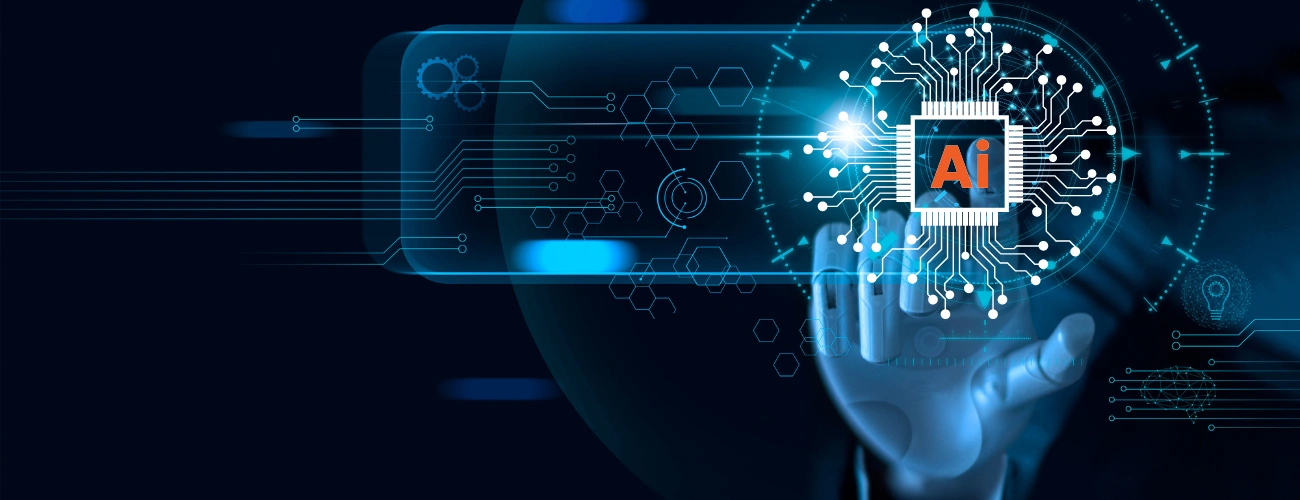Artificial Intelligence (AI) is revolutionizing various industries, and app development is no exception.
Integrating AI into apps enhances functionality, improves user experience, and drives innovation.
This comprehensive AI app development guide will walk you through the essential aspects of creating AI-powered apps, including the benefits, processes, and best practices.
Whether you are new to AI in app development or looking to refine your strategies, this guide will provide valuable insights and practical steps.
Embrace the future of technology by developing AI apps that stand out in the competitive market.
What Are AI Apps?
AI apps, or artificial intelligence applications, are software programs that use advanced algorithms and machine learning models to mimic human intelligence and perform tasks autonomously.
These tasks can range from simple functions like sorting data to complex processes such as natural language understanding, image recognition, and predictive analytics.
AI in mobile app development is designed to learn from data, adapt to new inputs, and improve their performance over time without explicit programming.
Developing AI apps involves integrating machine learning models and AI algorithms into mobile or web applications to enable intelligent behavior.
These apps can process vast amounts of data, identify patterns, and make decisions with minimal human intervention.
The core technologies behind AI apps include machine learning, deep learning, natural language processing (NLP), and computer vision.
- Machine Learning (ML): A subset of AI that involves training algorithms to learn from data and make predictions or decisions without being explicitly programmed for each task.
- Deep Learning: An advanced form of machine learning that uses neural networks with many layers (deep networks) to analyze and interpret complex data patterns.
- Natural Language Processing (NLP): Enables AI apps to understand, interpret, and generate human language, facilitating tasks like language translation, sentiment analysis, and chatbots.
- Computer Vision: Allows AI apps to interpret and process visual information from the world, enabling tasks such as image recognition, object detection, and facial recognition.
AI apps are transforming various industries by enhancing efficiency, improving decision-making processes, and providing personalized experiences to users.
As businesses continue to recognize the potential of creating AI apps, the demand for AI-powered solutions is rapidly increasing.
The Growing Market For AI-Powered Apps
The market for AI-powered apps is experiencing unprecedented growth, driven by advancements in technology and increasing demand across various sectors.
Here are some key statistics that highlight the expanding landscape of developing AI apps:
Market Size and Growth
- Global AI Market Value: The global artificial intelligence market is expected to reach $190.61 billion by 2025, growing at a CAGR of 36.62% from 2021 to 2025.
- AI in Mobile Apps: The AI in mobile applications market alone is projected to grow from $2.5 billion in 2020 to $18 billion by 2026, showcasing the rapid adoption of AI technologies in mobile platforms.
Industry Adoption
- Healthcare: AI applications in healthcare are set to reach $45.2 billion by 2026, enhancing diagnostics, personalized medicine, and patient care.
- Finance: The financial sector is investing heavily in AI, with the market for AI in fintech expected to grow from $6.7 billion in 2020 to $22.6 billion by 2025.
- Retail: AI in the retail industry is predicted to reach $23.32 billion by 2027, driven by personalized shopping experiences, inventory management, and predictive analytics.
Consumer Demand
- User Preferences: Over 70% of consumers are expected to interact with AI-powered applications daily by 2025, indicating a significant shift towards AI-driven user experiences.
- Voice Assistants: The use of voice assistants is rising, with an estimated 8 billion digital voice assistants to be in use by 2023.
Business Impact
- Cost Savings: Businesses implementing AI solutions report an average cost reduction of 30-40% in operations, showcasing the efficiency and scalability of AI technologies.
- Revenue Growth: Companies using AI for sales and marketing see an average revenue increase of 50%, highlighting the commercial benefits of creating AI apps.
As industries continue to adopt AI technologies, the opportunities for businesses to innovate and thrive using AI-powered solutions are immense.
Whether it's enhancing customer experiences, optimizing operations, or driving revenue growth, the market for AI-powered apps is poised for significant expansion.
Use of AI in Mobile Apps: Possibilities & Use Cases
Integrating AI into mobile apps opens up a world of possibilities, transforming the way users interact with technology and enhancing the overall app experience.
Here are some key industries and use cases for integrating AI into apps:
1. On-Demand Services
In On-Demand App Development, AI can revolutionize services by providing personalized user experiences and predictive analytics.
AI algorithms analyze user behavior and preferences to offer tailored service recommendations, while predictive analytics optimize service delivery in real-time, ensuring efficient resource allocation and minimizing wait times.
Personalized service recommendations based on user behavior.
Predictive analytics for optimizing service delivery.
2. Dating Apps
In Dating App Development, AI-powered matchmaking algorithms analyze user profiles, preferences, and behavior to suggest compatible matches, enhancing user satisfaction.
Moreover, AI chatbots facilitate conversations, provide icebreakers, and offer dating tips, improving user engagement within the app.
Matchmaking algorithms for suggesting compatible matches.
Chatbots for facilitating conversations and providing dating tips.
3. Food Delivery
AI can significantly enhance Food Delivery App Development by recommending restaurants and dishes based on user preferences and order history.
Delivery optimization algorithms ensure faster and more efficient deliveries, improving customer satisfaction and operational efficiency.
Personalized restaurant and dish recommendations.
Delivery optimization for faster and efficient deliveries.
4. Video Streaming
In Video Streaming App Development, AI-driven recommendation engines keep users engaged by suggesting content based on their viewing habits.
Enhanced search functionality powered by AI makes it easier for users to find the content they want to watch, improving user experience.
Content recommendations based on viewing habits.
Improved search functionality for easier content discovery.
5. Taxi Services
AI can implement dynamic pricing models in Taxi App Development, adjusting fares based on demand and traffic conditions.
Real-time navigation systems powered by AI provide route optimization, helping drivers avoid congestion and reach destinations faster.
Dynamic pricing models for adjusting fares.
Real-time navigation for route optimization.
6. eWallets
For eWallet App Development, AI can enhance security and manage finances more effectively.
Fraud detection algorithms analyze transaction patterns to prevent fraudulent activities, while AI-driven expense tracking and budgeting advice promote better financial habits.
Fraud detection for preventing fraudulent activities.
Expense tracking and budgeting advice.
7. eCommerce
In eCommerce development, AI can transform online shopping by enhancing customer experience and operational efficiency.
AI algorithms provide personalized product recommendations based on user behavior, while AI-powered chatbots handle customer support and queries.
In addition, AI helps in inventory management and demand forecasting, ensuring optimal stock levels.
Personalized product recommendations based on user behavior.
AI-powered chatbots for customer support.
Inventory management and demand forecasting.
By integrating AI into mobile apps, developers can create intelligent and adaptive applications that enhance user experiences, improve security, and provide valuable insights.
The possibilities are vast, and the use cases continue to expand as AI technology evolves.
Whether it's through personalized recommendations, intelligent assistants, or advanced security features, AI is revolutionizing the mobile app landscape, offering innovative solutions to meet the needs of modern users.
Why Use AI in Mobile Apps?
Integrating AI into mobile apps offers numerous advantages that significantly enhance the user experience and operational efficiency.
Here are some compelling reasons for creating AI apps:
Enhanced User Experience
AI can personalize the user experience by analyzing individual preferences and behaviors.
This allows apps to offer customized content, recommendations, and services that are tailored to each user.
For instance, AI-driven recommendation engines in video streaming apps suggest content based on user viewing habits, keeping users engaged and satisfied.
Improved Efficiency
AI automates repetitive and time-consuming tasks, freeing up resources and improving overall efficiency.
In service-based apps, AI can predict user demand and optimize service delivery, ensuring timely and efficient service. This not only enhances customer satisfaction but also reduces operational costs.
Advanced Security
Security is a critical concern in app development, and AI can significantly enhance it.
AI-powered biometric authentication methods, such as facial recognition and fingerprint scanning, provide secure access to apps.
In addition to this, AI algorithms can detect and prevent fraudulent activities in financial apps by analyzing transaction patterns in real-time.
Predictive Analytics
AI-driven predictive analytics provide valuable insights into user behavior and trends. This allows businesses to make informed decisions and anticipate user needs.
For example, in food delivery apps, AI can predict peak ordering times and optimize delivery routes accordingly, ensuring efficient service during high-demand periods.
Real-Time Assistance
AI chatbots and virtual assistants offer real-time assistance, improving customer support and engagement.
In dating apps, AI chatbots can facilitate conversations, provide dating tips, and enhance the overall user experience.
These virtual assistants can handle common queries and tasks, providing immediate support to users.
Scalability and Adaptability
AI technology is highly scalable and adaptable, making it suitable for a wide range of applications.
As user demands and market trends evolve, AI algorithms can be updated and retrained to meet new requirements.
This flexibility is particularly beneficial in eCommerce, where AI can continuously improve product recommendations and inventory management based on changing customer preferences.
Data-Driven Decision Making
AI provides actionable insights from vast amounts of data, enabling businesses to make data-driven decisions.
This is crucial in industries like video streaming, where understanding user preferences and viewing habits can drive content strategy and marketing efforts.
Competitive Advantage
Adopting AI technologies can provide a significant competitive advantage by differentiating your app from others in the market.
AI-driven features such as personalized recommendations, advanced security, and real-time assistance can enhance user satisfaction and loyalty, giving your app an edge over competitors.
By integrating AI into mobile apps, businesses can unlock a myriad of benefits that drive growth, improve user engagement, and enhance operational efficiency.
Whether it's through advanced security features, personalized experiences, or predictive analytics, AI is transforming the mobile app landscape and offering innovative solutions to meet the needs of modern users.
Unique Features of AI Apps
AI apps come with unique features that set them apart from traditional applications.
These features enhance user interaction, streamline processes, and provide intelligent solutions to complex problems.
Here are some key features of developing AI apps:
Personalized Recommendations
AI algorithms analyze user behavior, preferences, and past interactions to provide personalized recommendations.
This feature is widely used in eCommerce and streaming services, offering users products, movies, or music that align with their tastes.
Voice Recognition
Voice recognition technology allows users to interact with apps through voice commands.
AI-powered virtual assistants like Siri, Google Assistant, and Alexa use this technology to perform tasks, answer queries, and control smart devices, providing a hands-free user experience.
Image and Video Analysis
AI can analyze and process images and videos, enabling features like facial recognition, object detection, and image classification.
This is particularly useful in security applications, social media platforms, and augmented reality experiences.
Natural Language Processing (NLP)
NLP allows AI apps to understand, interpret, and generate human language.
This feature powers chatbots, language translation services, and sentiment analysis tools, enabling apps to interact with users more naturally and effectively.
Predictive Analytics
AI-driven predictive analytics use historical data to forecast future trends and behaviors.
Businesses leverage this feature to make informed decisions, optimize marketing strategies, and improve customer service by anticipating user needs.
Automated Responses
AI chatbots and virtual assistants can provide automated responses to user queries, handle customer support, and perform routine tasks.
This enhances efficiency and ensures users receive immediate assistance without human intervention.
Context-Aware Computing
AI apps can understand and respond to the context in which they are used.
For example, a context-aware AI app can adjust its functionality based on the user's location, time of day, or activity, providing a more relevant and personalized experience.
Enhanced Security
AI enhances security through biometric authentication methods like facial recognition and fingerprint scanning.
In addition, AI algorithms can detect anomalies and prevent fraud in real-time, ensuring secure transactions and protecting user data.
Smart Search
AI improves search functionality by understanding user intent and providing relevant results.
This feature is essential in apps with vast amounts of data, such as eCommerce platforms and content libraries, helping users find what they need quickly and efficiently.
Learning and Adaptation
AI apps continuously learn from user interactions and adapt to improve their performance over time.
This feature ensures that the app remains relevant and effective, providing users with an ever-improving experience.
By integrating these unique features, developers can create intelligent and adaptive applications that offer superior user experiences.
Whether it's through personalized recommendations, advanced security measures, or predictive analytics, AI is transforming the way apps function and interact with users, making them smarter and more efficient.
Popular Examples of AI App Development
AI app development has revolutionized various industries, leading to the creation of innovative applications that transform user experiences and streamline processes.
Here are some standout examples of developing AI apps that showcase the potential and versatility of artificial intelligence:
1) Netflix: Personalized Content Recommendations
Netflix leverages AI algorithms to analyze user viewing habits and preferences.
This enables the platform to offer personalized content recommendations, keeping users engaged by suggesting movies and TV shows that match their tastes.
The AI-driven recommendation system significantly enhances the user experience, making it easier for viewers to discover new content they are likely to enjoy.
2) Spotify: Music Discovery
Spotify uses AI to curate personalized playlists and recommend new music based on user listening history.
The AI-powered Discover Weekly feature has become a user favorite, introducing listeners to new artists and genres.
By analyzing patterns in music preferences, Spotify ensures a tailored music discovery experience that keeps users coming back for more.
3) Amazon: Product Recommendations
Amazon's AI-driven product recommendation system analyzes customer behavior and purchase history to provide personalized shopping suggestions.
This not only enhances the shopping experience but also boosts sales by promoting relevant items to users.
The intelligent recommendation engine plays a crucial role in Amazon's success, driving customer satisfaction and loyalty.
4) Google Photos: Advanced Image Recognition
Google Photos employs AI for sophisticated image recognition and organization.
The app can identify and categorize people, places, and objects in photos, making it easier for users to search and manage their photo collections.
AI-powered features such as automatic album creation and enhanced search capabilities greatly improve the user experience.
5) Siri: Virtual Assistant
Apple's Siri is a prime example of AI in virtual assistants. Siri understands and responds to voice commands, performs tasks, and answers questions.
By continuously learning from user interactions, Siri improves its accuracy and functionality over time, providing a seamless and intuitive user experience.
6) Grammarly: Writing Assistance
Grammarly utilizes AI to offer real-time writing suggestions, grammar checks, and style improvements.
The app helps users write more clearly and effectively by providing contextual recommendations.
Whether for professional or personal writing, Grammarly's AI-powered assistance ensures polished and error-free text.
7) Tesla: Autopilot
Tesla's Autopilot feature showcases AI's potential in the automotive industry.
By analyzing data from cameras, sensors, and GPS, Tesla's AI enables self-driving capabilities, allowing the vehicle to navigate and make driving decisions autonomously.
This innovation represents a significant step toward fully autonomous vehicles, enhancing safety and convenience.
8) Duolingo: Language Learning
Duolingo employs AI to personalize language learning experiences.
The app adapts to each user's learning pace and style, providing tailored lessons and feedback to enhance language acquisition.
Duolingo's AI-driven approach makes learning a new language engaging and effective.
9) ChatGPT: Conversational AI
ChatGPT, developed by OpenAI, is a powerful conversational AI that generates human-like text based on user prompts.
It is used in various applications, from customer support chatbots to content creation tools.
ChatGPT's ability to understand and generate natural language makes it a versatile tool for improving user interaction.
These examples highlight the diverse applications of AI in app development, demonstrating how AI can enhance user experiences, improve functionality, and drive innovation across different sectors.
AI App Development Process: Step-By-Step Guide
Developing an AI app involves several critical stages to ensure the final product is robust, user-friendly, and effective.
Here’s a comprehensive step-by-step guide to the AI app development process:
Step 1: Ideation and Planning
The initial phase of AI app development involves brainstorming ideas and planning the project.
This stage is crucial for setting a strong foundation for your app, ensuring that it addresses a real problem and meets market needs.
- Identify the Problem: Define the specific problem your AI app will solve. Understand the target audience and their needs.
- Market Research: Analyze the market to identify competitors and potential gaps. Research successful AI apps to gather insights.
- Define Objectives: Set clear objectives and goals for your app. Determine the key features and functionalities you want to include.
- Feasibility Study: Assess the technical and financial feasibility of your project. Identify the resources, technology stack, and expertise required.
Step 2: Data Collection and Preprocessing
Data is the backbone of any AI application.
This phase involves gathering, cleaning, and annotating data to ensure that your AI model is trained on high-quality, relevant information.
- Data Collection: Gather the necessary data for training your AI model. This could include text, images, audio, or other relevant data types.
- Data Cleaning: Clean the collected data to remove any noise or inconsistencies. Ensure the data is accurate and relevant.
- Data Annotation: Annotate the data if needed. For example, label images for object detection or tag text for natural language processing tasks.
Step 3: Choosing the Right AI Model
Selecting the appropriate AI model is essential for the success of your app.
This stage involves choosing the right algorithms, frameworks, and libraries to build a powerful and efficient AI solution.
- Model Selection: Choose the appropriate AI model based on your app’s requirements. This could involve machine learning, deep learning, or natural language processing models.
- Frameworks and Libraries: Select the AI frameworks and libraries that best suit your project, such as TensorFlow, PyTorch, or Scikit-learn.
- Model Training: Train the AI model using the preprocessed data. This involves feeding the data into the model and adjusting parameters to optimize performance.
Step 4: Development and Integration
In this phase, the backend and frontend development work takes place, and the AI model is integrated into the app.
Ensuring seamless integration and a user-friendly interface is critical to the app's success.
- Backend Development: Develop the server-side logic and database. Ensure the backend can handle the AI model’s requirements and integrate seamlessly with the frontend.
- Frontend Development: Design and develop the user interface. Ensure the UI is intuitive and user-friendly, providing a smooth user experience.
- API Integration: Integrate the AI model into the app via APIs. Ensure the AI functionalities are accessible and perform well within the app.
Step 5: Testing and Validation
Testing and validation ensure that your app functions correctly and meets user expectations.
This phase involves various types of testing to identify and fix issues before the app's release.
- Unit Testing: Test individual components of the app to ensure they function correctly.
- Integration Testing: Test the integration of different components to ensure they work seamlessly together.
- Performance Testing: Evaluate the app’s performance under various conditions. Ensure the AI model performs well and responds quickly.
- User Testing: Conduct user testing to gather feedback on the app’s usability and functionality. Make necessary adjustments based on user input.
Step 6: Deployment
The deployment phase involves launching your app and ensuring it operates smoothly in a live environment.
Continuous monitoring and maintenance are also essential to keep the app updated and secure.
- Prepare for Launch: Optimize the app for deployment, ensuring the AI model is refined, security measures are in place, and the app is scalable.
- App Store Submission: Submit the app to relevant app stores (Google Play, Apple App Store). Ensure compliance with their guidelines and requirements.
- Monitoring and Maintenance: After launch, continuously monitor the app for performance issues and user feedback. Regularly update the app to fix bugs, improve performance, and add new features.
By following these steps, you can effectively navigate the AI app development process and create a robust, user-friendly application that leverages the power of artificial intelligence to meet your users' needs and achieve your business goals.
Cost To Develop An AI App
Developing an AI app involves a significant investment, which can vary widely based on several factors.
Understanding the cost components and the overall investment required can help you plan and budget effectively.
The total average cost to create an AI app can range from $100,000 to $300,000, depending on the complexity of features, platform choice, development team location, and more.
Here’s a detailed cost breakdown:
| Component | Estimated Cost |
|---|---|
| App Design | $10,000 - $30,000 |
| Frontend Development | $20,000 - $60,000 |
| Backend Development | $25,000 - $70,000 |
| AI Model Training | $15,000 - $40,000 |
| API Integration | $10,000 - $20,000 |
| Admin Panel Development | $10,000 - $25,000 |
| Testing and QA | $8,000 - $15,000 |
| Deployment | $5,000 - $10,000 |
| Maintenance and Support | $12,000 - $20,000/year |
Example Cost Estimation
To give you a clearer picture, here’s an example cost estimation for developing a mid-range AI app:
| Feature/Component | Estimated Cost |
|---|---|
| Basic AI Model Training | $15,000 |
| User Interface Design | $20,000 |
| Frontend and Backend Development | $90,000 |
| API Integration | $15,000 - $40,000 |
| API Integration | $10,000 |
| Testing and Quality Assurance | $10,000 |
| Deployment | $5,000 |
| Total | $150,000 |
By considering these factors and cost components, you can better estimate the investment required for your AI app development project. Proper planning and budgeting will ensure that you allocate sufficient resources to create a high-quality, functional AI app that meets your business goals.
Challenges in AI App Development
Developing an AI app comes with its own set of challenges that can impact the overall success and effectiveness of the application.
Here are some common challenges faced during the AI app development process and strategies to overcome them:
1. Data Quality and Quantity
Challenge: AI models require vast amounts of high-quality data for training. Obtaining sufficient data that is clean, accurate, and relevant can be challenging.
Solution:
- Invest time in data collection and preprocessing to ensure data quality.
- Use data augmentation techniques to increase the dataset size.
- Leverage publicly available datasets and consider synthetic data generation if necessary.
2. Model Selection and Training
Challenge: Choosing the right AI model and training it effectively can be complex. The model must balance accuracy, complexity, and computational cost.
Solution:
- Evaluate different models to find the best fit for your specific use case.
- Experiment with various algorithms and fine-tune hyperparameters.
- Use established frameworks and tools like TensorFlow and PyTorch for efficient model training.
3. Integration with Existing Systems
Challenge: Integrating AI models into existing systems and ensuring they work seamlessly with other components can be difficult.
Solution:
- Plan the integration process carefully, considering the app’s architecture and dependencies.
- Use APIs and microservices to facilitate smooth integration.
- Conduct thorough testing to identify and resolve integration issues.
4. Performance Optimization
Challenge: AI models can be resource-intensive, leading to performance bottlenecks. Ensuring the app runs smoothly and efficiently is crucial.
Solution:
- Optimize AI models for speed and efficiency without compromising accuracy.
- Use hardware accelerators like GPUs and TPUs to improve performance.
- Implement caching and other performance-enhancing techniques.
5. Security and Privacy Concerns
Challenge: AI apps often handle sensitive user data, raising concerns about security and privacy. Ensuring data protection and compliance with regulations is essential.
Solution:
- Implement strong encryption methods to protect data.
- Use secure authentication mechanisms, such as multi-factor authentication and biometrics.
- Regularly audit and update security measures to address vulnerabilities.
6. Ethical and Bias Issues
Challenge: AI models can unintentionally perpetuate biases present in the training data, leading to unfair or unethical outcomes.
Solution:
- Ensure diverse and representative datasets to minimize bias.
- Regularly evaluate and test AI models for biased behavior.
- Implement ethical guidelines and frameworks to guide AI development.
7. Scalability
Challenge: As the user base and data volume grow, scaling the AI app to handle increased demand can be challenging.
Solution:
- Design the app architecture with scalability in mind from the start.
- Use cloud-based infrastructure to easily scale resources up or down.
- Implement load balancing and other techniques to manage high traffic.
8. Cost Management
Challenge: AI app development can be expensive, especially when considering data collection, model training, and infrastructure costs.
Solution:
- Plan and budget carefully, considering all potential expenses.
- Use cost-effective cloud services and open-source tools.
- Continuously monitor and optimize resource usage to control costs.
By recognizing and addressing these challenges, you can navigate the complexities of AI app development more effectively. Implementing strategic solutions ensures that your AI app is robust, secure, and scalable, ultimately leading to a successful and impactful product.
AI App Development Best Practices
Developing an AI app requires following best practices to ensure that the app is efficient, scalable, and user-friendly.
Here are some essential best practices for developing an AI app:
1. Start with a Clear Vision
Before diving into the development process, it is crucial to have a clear vision of what you want to achieve with your AI app.
Define the problem your app will solve and the specific features it will offer. This clarity will guide you throughout the development process.
Key Points:
- Identify the target audience and their needs.
- Define clear objectives and goals.
- Research the market and analyze competitors.
2. Prioritize Data Quality
High-quality data is the backbone of any successful AI application. Ensure that the data you collect is accurate, relevant, and comprehensive. Invest time in data cleaning and preprocessing to remove any inconsistencies or noise.
Key Points:
- Gather diverse and relevant data.
- Clean and preprocess data to ensure quality.
- Use data augmentation techniques to enhance data sets.
3. Choose the Right Model and Tools
Selecting the appropriate AI model and tools is critical for the success of your app. Choose models that best suit your app’s requirements and leverage robust frameworks and libraries to build and train your models.
Key Points:
- Evaluate different AI models (ML, DL, NLP) for suitability.
- Use established frameworks like TensorFlow, PyTorch, and Scikit-learn.
- Consider the trade-offs between accuracy, complexity, and computational cost.
4. Focus on User Experience (UX)
A user-friendly interface is essential for the success of your AI app. Design an intuitive and responsive UI that provides a seamless experience for users. Ensure that the AI features are integrated smoothly into the overall user experience.
Key Points:
- Design an intuitive and easy-to-navigate interface.
- Ensure AI features are seamlessly integrated.
- Conduct user testing to gather feedback and make improvements.
5. Implement Robust Security Measures
Security is paramount in AI app development. Protect user data and ensure that your app complies with data privacy regulations. Implement encryption, secure authentication methods, and regular security audits.
Key Points:
- Use encryption to protect sensitive data.
- Implement secure authentication methods (e.g., biometric authentication).
- Regularly update and audit security measures.
6. Optimize for Performance
Performance optimization is crucial for ensuring that your AI app runs smoothly and efficiently. Optimize the AI models for speed and accuracy, and ensure that the app performs well under various conditions.
Key Points:
- Optimize AI models for speed and accuracy.
- Ensure the app performs well under different conditions.
- Use performance monitoring tools to identify and address bottlenecks.
7. Plan for Scalability
Design your AI app with scalability in mind. Ensure that your app can handle increasing amounts of data and user traffic as it grows. Use cloud services and scalable infrastructure to support the app’s growth.
Key Points:
- Design the app architecture for scalability.
- Use cloud services to handle increasing data and traffic.
- Plan for future updates and feature expansions.
8. Conduct Thorough Testing
Testing is critical to ensure that your AI app functions correctly and meets user expectations. Conduct various types of testing, including unit testing, integration testing, and user testing, to identify and fix issues.
Key Points:
- Conduct unit testing for individual components.
- Perform integration testing to ensure seamless functionality.
- Gather user feedback through beta testing and make necessary adjustments.
9. Monitor and Maintain
After deployment, continuous monitoring and maintenance are essential to keep your AI app running smoothly. Regularly update the app to fix bugs, improve performance, and add new features. Monitor user feedback and make data-driven improvements.
Key Points:
- Continuously monitor app performance and user feedback.
- Regularly update the app to fix bugs and add new features.
- Use analytics to make data-driven improvements.
By following these best practices, you can ensure that your AI app is effective, user-friendly, and scalable. These practices will help you navigate the complexities of AI app development and deliver a high-quality product that meets your users’ needs and business goals.
DotStark, Here To Help You
At DotStark, we are a leading AI app development company dedicated to transforming your innovative ideas into intelligent, user-friendly applications.
With our extensive expertise in artificial intelligence, machine learning, and mobile app development, we offer comprehensive solutions tailored to your unique business needs.
Our team of skilled developers and data scientists works collaboratively to build high-quality AI apps that enhance user experiences, streamline processes, and drive business growth.
From ideation and planning to deployment and maintenance, we provide end-to-end services that ensure your AI app is robust, secure, and scalable.
Partner with DotStark to leverage cutting-edge AI technologies and take your business to the next level.
Contact us today to start your journey towards creating a successful AI-powered app!
Conclusion
Developing AI apps offers numerous benefits, from enhancing user experiences to improving operational efficiency and providing valuable insights. By following a structured development process and adhering to best practices, you can navigate the complexities of AI app development and create a robust, user-friendly application. Whether you're addressing data quality issues, optimizing performance, or ensuring security and scalability, each step is crucial to the success of your AI app.
Frequently Asked Questions
AI apps are software programs that utilize advanced algorithms and machine learning models to perform tasks autonomously. They mimic human intelligence to process data, recognize patterns, and make decisions without explicit programming for each task. Examples include recommendation systems, virtual assistants, and predictive analytics tools.
The cost to develop an AI app typically ranges from $100,000 to $300,000. This range depends on various factors such as the complexity of features, choice of platform (iOS, Android, or both), design requirements, and integration of third-party services. A detailed breakdown includes design, development, AI model training, testing, and deployment costs.
Integrating AI into app development offers numerous benefits, including personalized user experiences through tailored recommendations, improved operational efficiency by automating repetitive tasks, enhanced security with biometric authentication, and data-driven decision making through predictive analytics. AI also helps in providing real-time assistance and creating scalable solutions.
Common challenges in AI app development include ensuring high-quality and sufficient data, selecting and training the right AI model, integrating AI with existing systems, optimizing performance, maintaining security and privacy, addressing ethical and bias issues, managing scalability, and controlling development costs. Each challenge requires strategic planning and execution to overcome.
Ensuring data quality involves several steps: collecting relevant and diverse datasets, cleaning data to remove inconsistencies and noise, and annotating data to make it usable for training AI models. High-quality data is crucial for training accurate and reliable AI models. Techniques like data augmentation can also enhance the dataset.
Popular frameworks for AI app development include TensorFlow, PyTorch, and Scikit-learn. TensorFlow is widely used for machine learning and deep learning applications, PyTorch is favored for its flexibility and dynamic computation graph, and Scikit-learn is known for its simplicity and efficiency in implementing machine learning algorithms.
Security in AI apps is managed through multiple layers of protection, including encryption of sensitive data, secure authentication methods such as multi-factor authentication and biometrics, and regular security audits to identify and fix vulnerabilities. Ensuring compliance with data protection regulations like GDPR is also essential.
Industries that benefit significantly from AI apps include healthcare (for predictive diagnostics and personalized treatment plans), eCommerce (for personalized shopping experiences and inventory management), finance (for fraud detection and automated trading), entertainment (for content recommendations and user engagement), and many more.
AI improves user experience by offering personalized interactions based on user preferences, providing real-time assistance through chatbots and virtual assistants, and offering tailored recommendations for content, products, or services. These AI-driven features enhance user engagement, satisfaction, and retention by making the app more responsive and intuitive.











 +91 9680599916
+91 9680599916
 vanshika@dotstark.com
vanshika@dotstark.com
